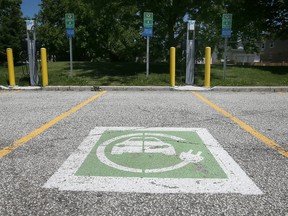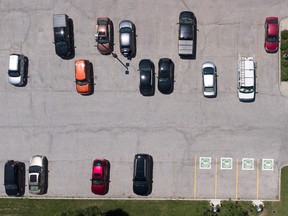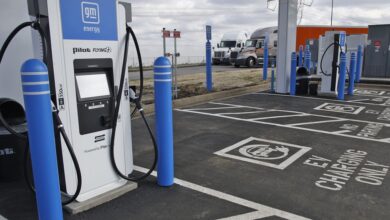Canadians more hesitant on EVs as their next vehicle purchase — study

Article content
Getting Canadians to consider an electric vehicle as their next vehicle purchase remains a tough sell, a new J.D. Power survey confirms.
Only 11 per cent of new-vehicle shoppers in Canada said they are ‘very likely’ to consider purchasing an EV as their next vehicle. That’s a decline of three per cent from 2023.
“Auto manufacturers are staking their futures on EVs and investing massive sums in battery manufacturing facilities in Canada, but the reality is that they are still considerably more expensive than comparable gas-powered vehicles and more education is needed to help shoppers feel comfortable making the transition,” said JD Ney, director of automotive practice at J.D. Power Canada.
Advertisement 2
Article content
According to the latest Statistics Canada data released in March, there were 5,000 fewer new EV registrations (51,156) in the final quarter of 2023 compared to the third quarter (56,232).
Sales of gas-powered vehicles for most automakers were also flat or even slightly down in the fourth quarter of 2023.
Despite that decline in EV sales, the fourth-quarter figures were the second-best quarter ever in Canada. The overall sales for 2023 hit a record 184,578, which represents a 34.6 per cent increase over 2022.
“I’d put more weight in what consumers do than what they’re planning,” said Brendan Sweeney, managing director of the Trillium Network of Advanced Manufacturing.
“Prices and interest rates scare people off; they might be doing that now for anyone looking at buying a new car.”
Automakers and governments pushing the industry to meet aggressive timelines on EV sales mandates are still facing the same three obstacles in achieving those goals.
The J.D. Power 2024 Canada Electric Vehicle Consideration (EVC) study released Thursday found consumers are still wary of cost and anxious about range and the lack of an extensive charging network.
Advertisement 3
Article content
Concern over range was the most frequently cited obstacle to buying an EV (68 per cent), followed by price (61 per cent) and lack of charging infrastructure (60 per cent).
“While tackling the affordability problem is going to take some time, the other big obstacles right now—vehicle range and lack of experience with EVs—can be mitigated by broad consumer education,” said Ney.
Price issues will be addressed as scale of production increases in the coming years drive prices down, said Sweeney.
With the distance per charge now commonly reaching 400 to 500 kilometres, range anxiety is becoming limited to drivers who regularly drive long distances, he added. Charging times are also rapidly improving, reducing those concerns as well.
However, the lack of widespread charging infrastructure remains a difficult hurdle to clear.
“Until people don’t have to think about where they can get a charge when they’re down to their final 50 kilometres, it’s going to be an impediment,” Sweeney said. “They don’t have to do that with their gas-powered vehicles and they want the same with their EV.”
Advertisement 4
Article content
Sweeney said it doesn’t help that only 52 per cent of Canadians have driven in an EV. However, among those that have driven one, 36 per cent indicated they are somewhat likely or very likely to consider purchasing an EV.
It’s kind of become politicized
Sweeney feels government EV mandates have also tainted the perception of those vehicles for some.
“There are people who haven’t been in an EV, but have decided they don’t like them,” Sweeney. “It’s kind of become politicized, not wanting to be told what to do.
“It’s not about the performance of the vehicle, it’s about something else.”

Sweeney said it’s unrealistic to expect the federal mandates on new car sales will be met. Currently, the target dates are 20 per cent of new car sales must be EVs by 2026, 60 per cent by 2030 and 100 per cent by 2035.
In 2023, new EV registrations represented 10.8 per cent of total new car sales.
“I like that the government set ambitious targets,” Sweeney said. “We’re not likely to hit 60 per cent in 2030, it might have to be adapted to 40 or 50 per cent.”
The study also found Canadians are far more reluctant to consider buying an EV than American consumers. More than twice as many Americans (24 per cent) were open to an EV as their next purchase.
Advertisement 5
Article content
Only 58 per cent of Americans said it was very or somewhat unlikely they would buy an EV for their next purchase compared to 72 per cent of Canadians. That’s an increase of five per cent among Canadians over 2023 and 18 per cent over 2022.
“The affordability calculus I think is different in the U.S.,” Sweeney explained. “The American consumer tends to have better access and better pricing for vehicles. The American consumer is reacting to different things than the Canadian consumer.”
Recommended from Editorial
Sweeney points out Americans have access to a wider array of incentives and the economic might of states like California are aggressively driving the adoption of EVs and that inevitably spills over the border to Canada.
“The North American industry exists to serve American consumers and Canadians are second,” Sweeney said.
“California is gung-ho on EVs, they’re leading the way. The EV transition requires patience, but it will happen.
“It used to be people would say they’d never buy a Japanese vehicle. Now, the parking lots are full of them.”
Twitter.com/winstarwaddell
Article content





